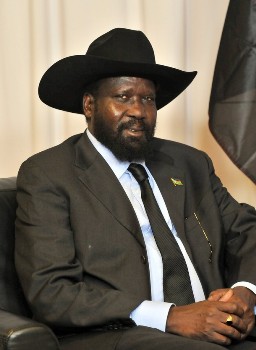Sudan’s Kiir objects to national security act
December 21, 2009 (KHARTOUM) — General Salva Kiir Mayardit, First Vice President of the Republic and the leader of the Sudan People’s Liberation Movement (SPLM) objected to the National Security Act passed by a mechanical majority vote on Sunday by the NCP block at the National Assembly saying he is not supportive of the act.
 This raised concerns about the eligibility of the act since there are speculations from members of SPLM parliamentary bloc in the National Assembly such as Yasir Saeed Arman and Ramadan Shamila that Salva Kiir Mayardit, the chairman of the party may not sign once the law is returned to the Presidency for promulgation.
This raised concerns about the eligibility of the act since there are speculations from members of SPLM parliamentary bloc in the National Assembly such as Yasir Saeed Arman and Ramadan Shamila that Salva Kiir Mayardit, the chairman of the party may not sign once the law is returned to the Presidency for promulgation.
This act holds the central and massive significance because it will have profound impact on the conduct of free and fair elections, Arman said calling on civil society and international human rights organizations to support opposition against it.
Arman who said has experienced authoritarian and oppressive security handling, further called on all people of goodwill and humanitarian organizations worldwide to stand against it.
“I have personally experienced this, when security organs beat me (on December 7) and abused me in the worst manner, I knew that through this personal experience of mine that this country lives in a state of unannounced curfew that denies individual rights leaving no rooms for democracy to exist.”
He blamed judicial organs describing them as allegiance hence becomes dysfunctional to the masses since they function through manipulated system.
He said judicial organs do not function as professional institutions but as manipulated institutions that negatively affects Sudan and is harmful for major cases that need solutions.
On Sunday, the Interim National Assembly passed the controversial national security law by majority vote act just hours after the opposition National Democratic Alliance (NDA) walked out of during its final reading.
The SPLM parliamentary caucus remained in the parliament objecting to the passage of the act.
In a heated discussion which went on for over four hours with more than three hundred and fifty members in attendance, the National Assembly, predominantly controlled by NCP members, hurriedly endorsed the national security bill amidst storm-like debates among the members of the parliament.
The heated discussion prompted SPLM’s Ramadan Shiela to call the contested bill a con while the speaker of the Assembly Ahmed Ibrahim El-Thahir called the passage a victory saying it conforms to the law and he considered it one of the best laws in the world.
Prior to the passage, the SPLM caucus repeatedly requested the members of the parliament to give the law more time for consultations between parliamentary blocs, saying the bill represents Sudanese people from different walks life in the whole Sudan and not a single party.
However, as the house predominantly filled by members of the ruling NCP, engaged in passing the bill by articles purportedly requested by the speaker of the assembly, SPLM parliamentarians infuriated by the conduct walked out of the session, leaving only Deputy Speaker Atem Garang to witness the passing.
The act gives the security apparatus powers to detain suspects for a period up to three months. However, the SPLM and other parliamentary blocs want security organs to only gather information without the power to detain.
Members of the NDA such as Suleiman Hamid reportedly seen walking out of the parliament in protest criticized the passing of the bill saying it constitutes a clear violation of the interim constitution which give rooms for democratic reforms.
Speaking during a press conference, Hamid said his party denounces and does not recognize the bill as legal adding he seeks to appeal the law through the Constitutional Court.
He also said that the passage of this bill will not stop the opposition NDA and other parliamentary blocs from pursuing alternatives.
“Our struggle will continue through public rallies and symposiums demanding cancellation of all rigid laws.”
“Our meetings will not be restricted only to the Assembly; but will be extended to unions, civil society organizations and political parties,” he said adding that there is a force of allied political parties that will continue the struggle against this decision.
(ST)
